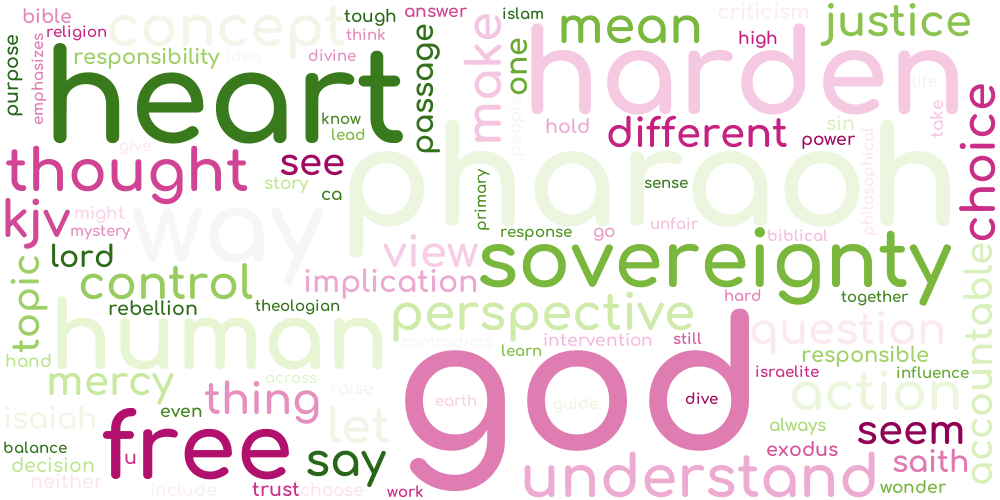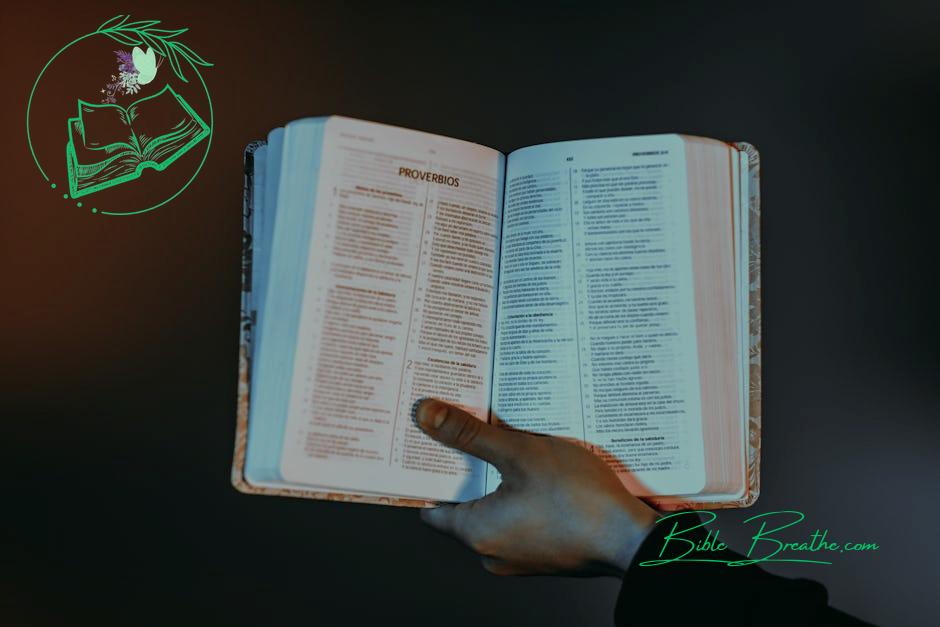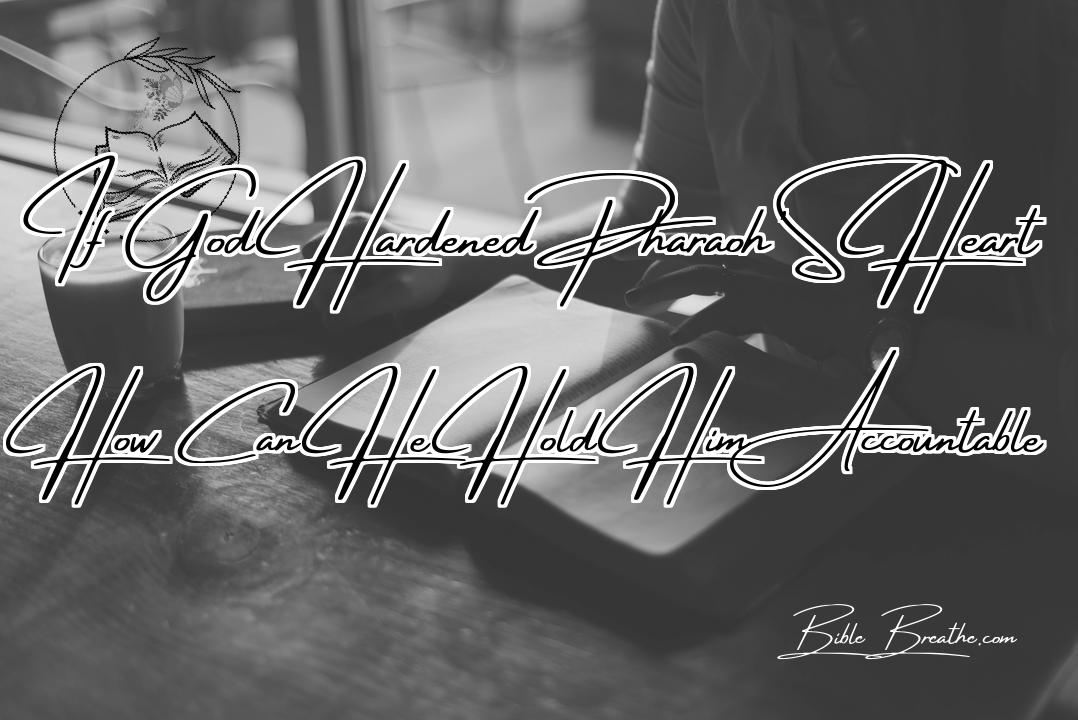Key Takeaways
- The concept of God hardening Pharaoh’s heart is a complex and debated topic among biblical scholars and theologians.
- In the biblical account of the Exodus, God is said to have hardened Pharaoh’s heart, making it impossible for him to let the Israelites go (Exodus 4:21, 7:3, 9:12).
- However, Pharaoh is still held accountable for his actions, and God judges him for his stubbornness and refusal to obey (Exodus 14:4, Romans 9:17).
- One possible interpretation is that God’s hardening of Pharaoh’s heart was a form of judgment, rather than a cause of his stubbornness. In other words, Pharaoh’s heart was already inclined towards rebellion, and God’s action was a way of confirming and intensifying that rebellion.
- Another perspective is that the Hebrew concept of “hardening” (qashah) implies a sense of stubbornness or obstinacy, rather than a complete loss of free will. Pharaoh still had the capacity to choose, but his heart was hardened against God’s will.
- The biblical account suggests that God’s sovereignty and human responsibility are not mutually exclusive, but rather, they coexist in a complex and mysterious way. As the apostle Paul writes, “God has mercy on whom he wants to have mercy, and he hardens whom he wants to harden” (Romans 9:18), Predestination.
Introduction
What Does it Mean for God to Harden Pharaoh’s Heart?
Have you ever wondered about the concept of God hardening Pharaoh’s heart? It’s a pretty complex topic that has sparked debates among theologians and philosophers for centuries. In the Bible, we see that God hardened Pharaoh’s heart, making it seem like Pharaoh had no choice but to refuse to let the Israelites go. But if that’s the case, how can God hold Pharaoh accountable for his actions?
Why is This Topic Important?
This topic is crucial in understanding the nature of God’s sovereignty and human free will. It raises questions about the balance between God’s control and our own choices. If God can harden someone’s heart, does that mean we’re just puppets on strings, or do we still have a say in our decisions?
Purpose of This Article
In this article, we’ll delve into the concept of God hardening Pharaoh’s heart and explore its implications on our understanding of God’s sovereignty and human accountability. We’ll examine the biblical context, discuss the different perspectives on this topic, and see what we can learn from this ancient story.
Theology Alert!
- Monergism: The idea that God is the sole cause of every event, including human decisions.
- Synergism: The idea that God and humans work together to bring about events and decisions.
A relevant quote from a famous theologian:
“The only Thinker in theology is God.” – A.W. Tozer
What are your thoughts on this topic? Do you think God’s sovereignty contradicts human free will?
This word cloud provides a visual summary of the key concepts we’ll be exploring.

Word cloud by BibleBreathe.com about if god hardened pharaohs heart how can he hold him accountable
Biblical Context

Photo modified by BibleBreathe.com. Original photo by Luis Quintero on Pexels
Overview of the Exodus Story
Let’s dive into the Exodus story, where we find the account of God hardening Pharaoh’s heart.
It’s a story of liberation, miracles, and God’s power. The Israelites were stuck in slavery, and God heard their cries for help. He sent Moses to lead them out of Egypt, but Pharaoh wasn’t having it.
Specific Passages Where God Hardens Pharaoh’s Heart
So, what about those passages where God hardens Pharaoh’s heart? Let’s take a look:
| Passage | Description |
|---|---|
| Exodus 4:21 | God tells Moses He’ll harden Pharaoh’s heart. |
| Exodus 7:3 | God says He’ll harden Pharaoh’s heart so he won’t let the Israelites go. |
These passages can be tough to understand. It seems like God is making Pharaoh do the wrong thing. But is that really what’s going on?
Different Perspectives on the Meaning of These Passages
There are different ways to look at these passages. Some people think God is literally controlling Pharaoh’s actions, while others see it as God allowing Pharaoh’s heart to become harder.
| Perspective | Description |
|---|---|
| Calvinist view | God sovereignly controls all things, including Pharaoh’s heart. |
| Arminian view | God gives humans free will, and Pharaoh chooses to harden his own heart. |
It’s not always easy to understand the Bible, but that’s what makes it so interesting. We can learn from different perspectives and grow in our faith.
For my thoughts are not your thoughts, neither are your ways my ways, saith the Lord.” (Isaiah 55:8, KJV)
As the Bible says, God’s ways are not our ways. We might not always understand why things happen, but we can trust in God’s goodness and sovereignty.
Theological Interpretations
Understanding the Concept of God Hardening Pharaoh’s Heart
So, let’s dive into this whole concept of God hardening Pharaoh’s heart. It’s a tough one, and it’s natural to wonder, “If God hardened Pharaoh’s heart, how can He hold him accountable?”
It’s like trying to wrap our heads around a logical puzzle. We want to make sense of it, but it seems to go against our understanding of God’s justice and mercy.
| Theological Perspective | Explanation |
|---|---|
| Calvinism | According to Calvinism, God’s sovereignty is absolute, and He is in control of all things, including Pharaoh’s heart. This view emphasizes God’s power and control. |
| Arminianism | Arminianism, on the other hand, emphasizes human free will and suggests that Pharaoh’s heart was hardened due to his own rebellion against God. This view highlights human responsibility. |
Implications for God’s Justice and Mercy
So, what are the implications of this concept for our understanding of God’s justice and mercy?
Here are three key things to consider:
- God’s sovereignty vs. human free will: This debate raises questions about the balance between God’s control and human responsibility. It’s a tension that’s hard to resolve, but it’s essential to acknowledge both aspects.
- The role of sin and rebellion: Pharaoh’s hard heart was a result of his own sin and rebellion against God. This highlights the importance of personal responsibility and the consequences of our actions.
- God’s mercy and justice: Ultimately, God’s hardening of Pharaoh’s heart was a demonstration of His justice, but it also shows His mercy in allowing Pharaoh to continue in his rebellion, giving him opportunities to repent.
“The king’s heart is in the hand of the Lord, as the rivers of water: he turneth it whithersoever he will.” (Proverbs 21:1, KJV)
“And it shall be, when he sitteth upon the throne of his kingdom, that he shall write him a copy of this law in a book out of that which is before the priests the Levites:” (Deuteronomy 17:18, KJV)
Philosophical Implications
Analysis of the Philosophical Questions Raised by the Concept
Let’s dive into the deep end of this topic.
If God hardened Pharaoh’s heart, how can He hold him accountable?
It’s a question that’s puzzled many of us, and it’s not just about Pharaoh – it’s about free will and divine intervention.
Here are some philosophical questions that come to mind:
- Is Pharaoh responsible for his actions if God hardened his heart?
- Does God’s intervention negate Pharaoh’s free will?
- How can we reconcile God’s sovereignty with human responsibility?
Discussion of the Relationship Between Free Will and Divine Intervention
It’s a delicate balance between God’s sovereignty and human free will.
On one hand, we have Romans 9:17-18 (KJV), which says, “For the scripture saith unto Pharaoh, Even for this same purpose have I raised thee up, that I might shew my power in thee, and that my name might be declared throughout all the earth. Therefore hath he mercy on whom he will have mercy, and whom he will he hardeneth.”
On the other hand, we have Deuteronomy 30:19 (KJV), which says, “I call heaven and earth to record this day against you, that I have set before you life and death, blessing and cursing: therefore choose life, that both thou and thy seed may live.
| Perspective | Relationship Between Free Will and Divine Intervention |
|---|---|
| Calvinist | God’s sovereignty is primary, and human free will is secondary. |
| Arminian | Human free will is primary, and God’s sovereignty is secondary. |
“The line between fate and free will is constantly blurred.” – F. Scott Fitzgerald
So, how do we make sense of all this?
Perhaps the answer lies in the mystery of God’s ways.
As Isaiah 55:8-9 (KJV) says, “For my thoughts are not your thoughts, neither are your ways my ways, saith the Lord. For as the heavens are higher than the earth, so are my ways higher than your ways, and my thoughts than your thoughts.”
We may not have all the answers, but we can trust in God’s goodness and His sovereignty.
Criticisms and Counterarguments
Overview of the Criticisms of the Concept
Let’s face it – the idea that God hardened Pharaoh’s heart can be tough to swallow.
Some people might say, “Wait a minute, if God is the one who hardened Pharaoh’s heart, then how can He hold Pharaoh accountable for his actions?”
That’s a fair question.
Here are some of the criticisms of this concept:
- It seems unfair: If God is the one who hardened Pharaoh’s heart, then doesn’t that mean Pharaoh didn’t have a choice?
- It contradicts free will: If God is controlling Pharaoh’s actions, then doesn’t that mean Pharaoh didn’t have free will?
- It makes God seem cruel: If God is the one who hardened Pharaoh’s heart, then doesn’t that mean He’s responsible for Pharaoh’s evil actions?
Responses to These Criticisms from Different Perspectives
So, how do we respond to these criticisms?
Here are a few different perspectives:
- The Sovereignty of God: From a biblical perspective, God is sovereign over all things, including the human heart. This doesn’t mean we don’t have free will, but it does mean that God can influence our decisions.
- The Hardening of the Heart: The Bible also talks about how our hearts can become hardened through sin and rebellion. Pharaoh’s heart was already hard, and God simply confirmed that hardness.
- The Mystery of God’s Ways: Let’s be real – we can’t fully understand God’s ways. His thoughts are higher than our thoughts, and His ways are higher than our ways. (Isaiah 55:9, KJV)
| Criticism | Response |
|---|---|
| It seems unfair | God’s sovereignty doesn’t mean we don’t have free will. |
| It contradicts free will | Our choices are still our own, but God can influence them. |
For my thoughts are not your thoughts, neither are your ways my ways, saith the Lord.” (Isaiah 55:8, KJV)
Comparative Analysis

Photo modified by BibleBreathe.com. Original photo by Pixabay on Pexels
Understanding the Concept of Hardening Hearts Across Religions
Have you ever wondered how the concept of God hardening Pharaoh’s heart is viewed in other religious traditions?
| Religion | View on Hardening Hearts |
|---|---|
| Judaism | Emphasizes God’s sovereignty and the human heart’s ability to choose. |
| Islam | Teaches that God guides whom He wills and leads astray whom He wills (Quran 35:8). |
Similarities and Differences in Perspective
So, what can we learn from these different perspectives?
- God’s sovereignty is a common thread: Across these religions, there’s a recognition that God is in control and has the power to guide or harden hearts.
- Human choice and responsibility: However, there’s also an emphasis on human choice and responsibility in Judaism and Christianity, whereas Islam places more emphasis on God’s guidance.
- Purpose and outcome: The reasons behind God’s hardening of hearts differ across these traditions. In Christianity, it’s often seen as a means to fulfill God’s purposes, while in Islam, it’s more about guiding or leading astray.
A Reflection on Human Understanding
We can’t fully understand why God chooses to harden some hearts and not others. As the Bible says, “For my thoughts are not your thoughts, neither are your ways my ways, saith the Lord” (Isaiah 55:8, KJV).
“The only true wisdom is in knowing you know nothing.” – Socrates
This concept is a reminder of our limited understanding and the importance of trusting in God’s sovereignty, even when we don’t have all the answers.
Practical Implications
Discussion of the Implications of the Concept for Personal Faith and Practice
Let’s get real for a second. If God hardened Pharaoh’s heart, how can He hold him accountable? It’s a tough question, and one that can make us wonder about God’s justice.
But here’s the thing: God’s ways are not our ways. We can’t always understand why He does what He does, but we can trust that He’s got a bigger plan.
| Question | Answer |
|---|---|
| Is God unfair? | No, God is just and righteous. He sees the whole picture, not just our limited view. |
| Does God force people to sin? | No, God doesn’t force people to sin. He gives us free will, and we make our own choices. |
Suggestions for Further Reflection and Study
So, what can we take away from this concept?
Here are three key things to think about:
- God’s sovereignty is not a cop-out: Just because God is in control doesn’t mean we’re not responsible for our actions. We’ve got to take ownership of our choices.
- We can’t always understand God’s ways: Sometimes we just have to trust that God knows what He’s doing, even when it doesn’t make sense to us.
- God’s justice is not like ours: God’s justice is not just about punishing the bad guys; it’s about restoring and redeeming us.
For my thoughts are not your thoughts, neither are your ways my ways, saith the Lord.” (Isaiah 55:8, KJV)
As the famous theologian, Charles Spurgeon, once said, “The mysteries of God are not to be pried into, but to be adored.” Let’s take some time to reflect on this concept and how it applies to our own lives.
Frequently Asked Questions About If God Hardened Pharaohs Heart How Can He Hold Him Accountable
What is the meaning of ‘hardened Pharaoh’s heart’ in the Bible?
In the Bible, ‘hardened Pharaoh’s heart’ refers to God’s sovereign action in making Pharaoh’s heart stubborn and resistant to His will. This hardening allowed God to demonstrate His power and glory through the ten plagues, ultimately leading to Israel’s deliverance from slavery. It’s a complex theological concept, highlighting God’s sovereignty and human responsibility.
How Does the Concept of Free Will Relate to the Story of Pharaoh in the Bible?
In the story of Pharaoh, God hardens his heart, raising questions about free will. However, this doesn’t negate Pharaoh’s responsibility for his actions. Rather, it highlights God’s sovereignty and Pharaoh’s pre-existing hardness of heart. Pharaoh still made choices, but God’s influence shaped the outcome, demonstrating the complex interplay between human free will and divine providence.
What Are Some Interpretations of the Story of Pharaoh in the Bible?
The story of Pharaoh in the Bible has multiple interpretations. Some see it as a demonstration of God’s power and sovereignty over earthly rulers. Others view it as a lesson in stubbornness and the consequences of disobedience. Additionally, it can be seen as a foreshadowing of Jesus’ redemption, with Moses representing salvation and Pharaoh symbolizing sin and oppression.
{
“@context”: “https://schema.org”,
“@type”: “FAQPage”,
“mainEntity”: [
{
“@type”: “Question”,
“name”: “What is the meaning of ‘hardened Pharaoh’s heart’ in the Bible?”,
“acceptedAnswer”: {
“@type”: “Answer”,
“text”: “In the Bible, ‘hardened Pharaoh’s heart’ refers to God’s sovereign action in making Pharaoh’s heart stubborn and resistant to His will. This hardening allowed God to demonstrate His power and glory through the ten plagues, ultimately leading to Israel’s deliverance from slavery. It’s a complex theological concept, highlighting God’s sovereignty and human responsibility.”
}
},
{
“@type”: “Question”,
“name”: “How Does the Concept of Free Will Relate to the Story of Pharaoh in the Bible?”,
“acceptedAnswer”: {
“@type”: “Answer”,
“text”: “In the story of Pharaoh, God hardens his heart, raising questions about free will. However, this doesn’t negate Pharaoh’s responsibility for his actions. Rather, it highlights God’s sovereignty and Pharaoh’s pre-existing hardness of heart. Pharaoh still made choices, but God’s influence shaped the outcome, demonstrating the complex interplay between human free will and divine providence.”
}
},
{
“@type”: “Question”,
“name”: “What Are Some Interpretations of the Story of Pharaoh in the Bible?”,
“acceptedAnswer”: {
“@type”: “Answer”,
“text”: “The story of Pharaoh in the Bible has multiple interpretations. Some see it as a demonstration of God’s power and sovereignty over earthly rulers. Others view it as a lesson in stubbornness and the consequences of disobedience. Additionally, it can be seen as a foreshadowing of Jesus’ redemption, with Moses representing salvation and Pharaoh symbolizing sin and oppression.”
}
}
]
}
Matt Turner
I’m Matt, and I love breaking down Bible verses in a way that’s easy to understand and apply to everyday life. My goal is to help you connect with God’s Word and find practical ways to live it out. Whether you’re new to the Bible or just looking for some fresh insights, I’m here to walk with you and share what I’ve learned along the way.

